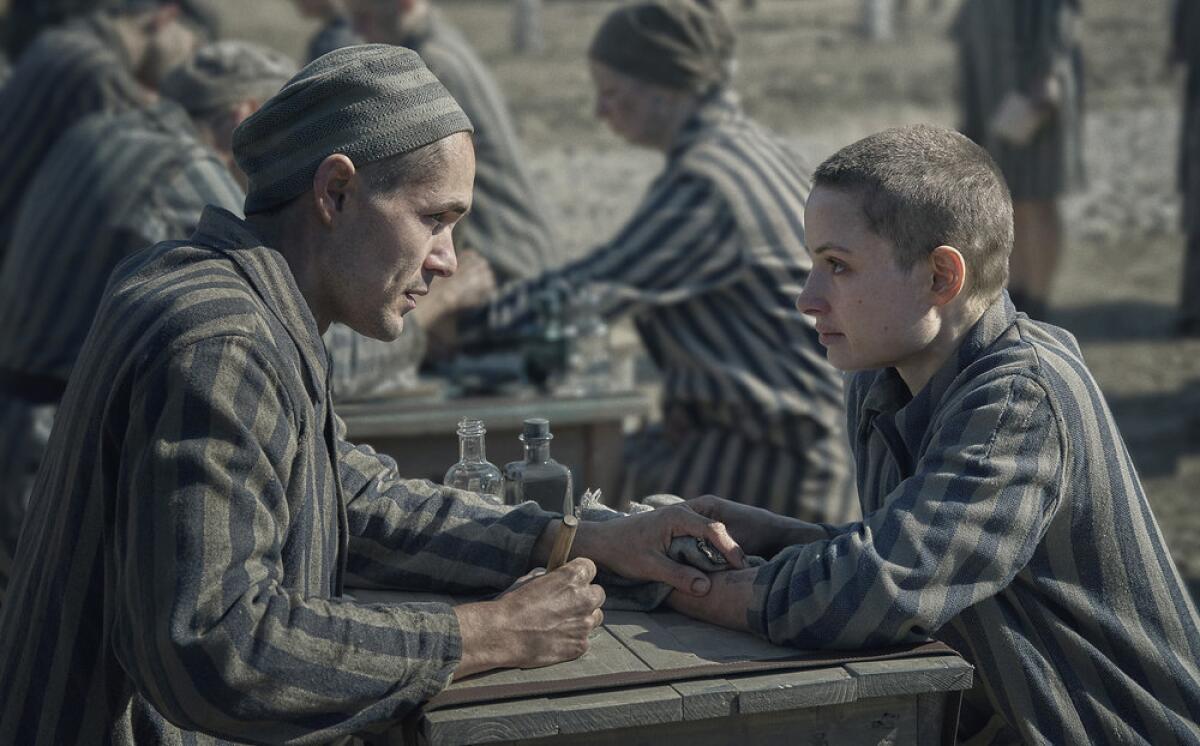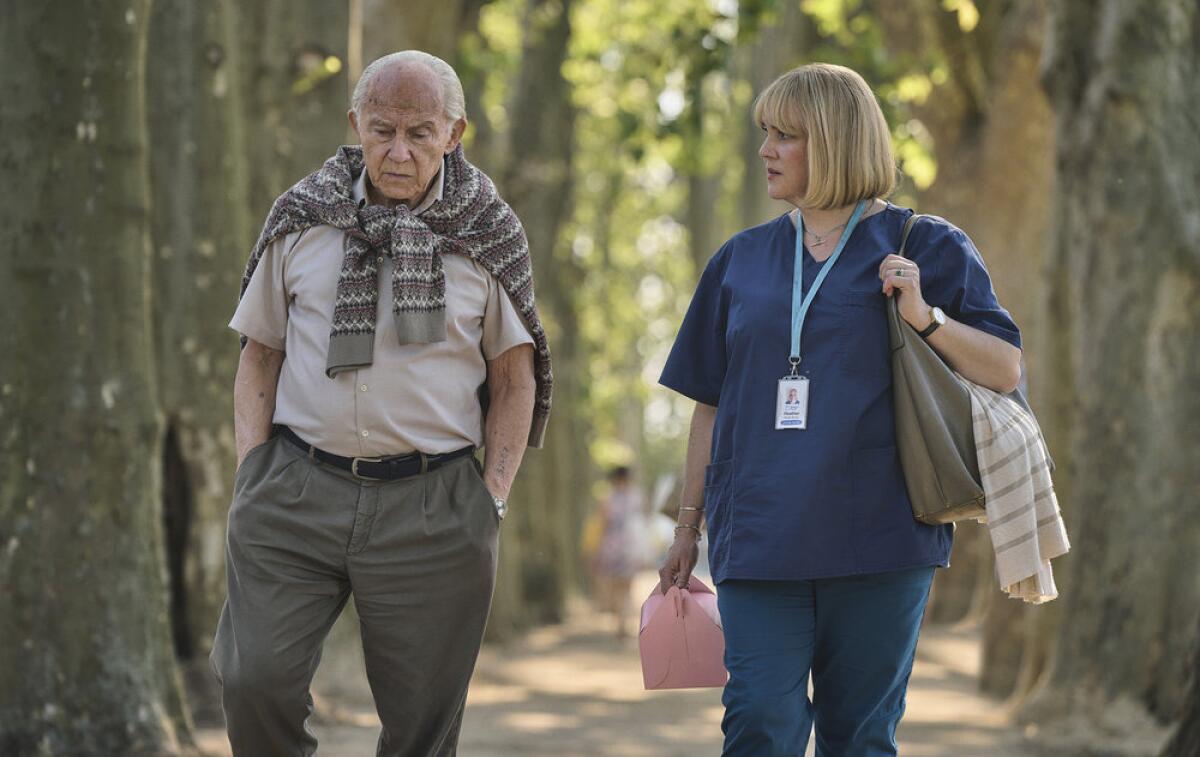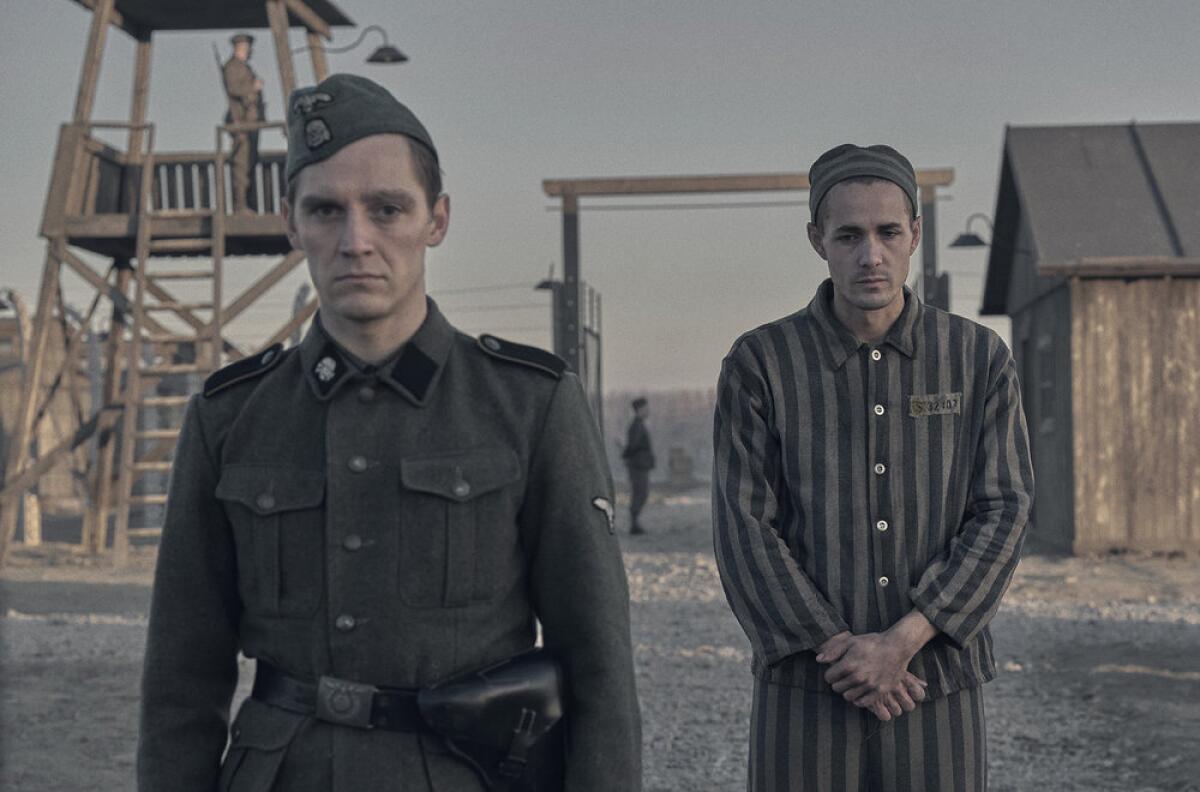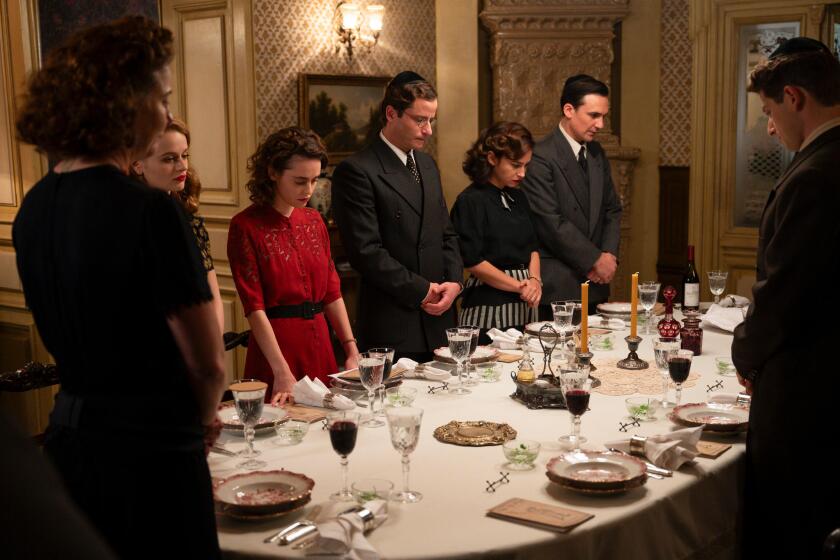‘The Tattooist of Auschwitz’ is both love story and reminder of the Holocaust and its horrors

- Share via
“This is a love story,” says Lali Sokolov (Harvey Keitel) at the beginning of “The Tattooist of Auschwitz,” as a caveat, or perhaps a come-on — not your usual Holocaust tale, then, that we’re about to begin. (Though there will be plenty of the usual, as well.)
The memories of real-life survivor Sokolov (played by Keitel old, and Jonah Hauer-King young) became the basis of a 2018 novel by New Zealand writer Heather Morris, who interviewed him over three years with an eye to writing a screenplay. The novel it became sold many copies and topped the New York Times bestseller list — no better guarantee of a picture deal — and sits on a shelf among similarly titled volumes, including “The Librarian of Auschwitz,” “The Midwife of Auschwitz,” “The Dressmakers of Auschwitz,” “The Last Boy in Auschwitz,” “The Sisters of Auschwitz,” “The Redhead of Auschwitz” and “Lovers in Auschwitz.” Apparently the story of Lali and Gita Sokolov wasn’t unique.
In this television telling, premiering Thursday on Peacock and soberly directed by Israeli filmmaker Tali Shalom-Ezer (“Princess”), novice writer Morris (Melanie Lynskey) becomes a character, deposing Lali at his request; he wants to get his story out. The action alternates between scenes of their meetings and the story he’s telling her. Though we spend much more time in the past, the series is as much about the recent business as the distant one.

In 1942, Lali, a Slovakian Jew, is sent to the expanding concentration camp at Auschwitz-Birkenau where, after a period of disorientation, he is put to work tattooing serial numbers on the forearms of new prisoners. The job affords him some comforts — greater freedom of movement, his own room — even as it puts him in danger. “You are working for the SS now,” says SS officer Stefan Baretzki (Jonas Nay), his manager. “You will need protection. Trust me.”
Lali is at work one day in the women’s camp when up steps Gita (Anna Próchniak). It is love at first sight for both.
“Your eyes, are they blue?” she asks him. (Close up on Lali’s eyes.)
“Sometimes.”
“Today, they look like the sky.”
(Then she asks if she can get her tattoo in pink.)
We know from the start, obviously, that Lali will survive; Gita’s fate isn’t explicitly stated until the end of the third episode. (“I did wonder when you would tell me,” Heather tells Lali). That she survived as well is not a spoiler; it’s been stated in every press release and promotional posting. There are other characters whose fate remains uncertain, though with a couple of exceptions we invest in them as a class, rather than as individuals. The spotlight is on our couple and to some extent on Baretzki, who, by action or inaction, makes their difficult liaison possible — because, seemingly, he cares for Lali.
Based on Georgia Hunter’s novel, ‘We Were the Lucky Ones’ succeeds because it never leaves its characters’ sides to take in the bigger picture.
In one extraordinary moment, the SS officer, drunk and disheveled, holds Lali (who is concerned for the health of an ailing Gita) and coos, “We’ll get through this. I’m here for you.”
Baretzki and other ghosts haunt modern-day Lali; they sit beside him on his couch, look over his shoulder, watch from across the room, questioning his memory as he speaks to Heather. Lali is an ordinary unreliable narrator in that he’s digging out things that happened some 60 years before; but there are also things he has protectively buried and isn’t ready to face. Interludes in which the accusing faces of prisoners silently fill the frame act as a sort of externalization of his survivor’s guilt. These are useful dramatic devices, but repeated over a six-hour series, they do start to feel a little pat, even cheesy.
If “The Tattooist” doesn’t quite register as an Uplifting Testament to the Power of the Human Spirit — to its credit, I’d say — it’s an honorable project, honorably made, moving at times, horrifying at others, in broad strokes and small details. (“After the shower there will be coffee and rolls,” we hear a guard tell a new group of prisoners,” followed by Baretzki telling Lali, without irony, not to stare because he’ll “frighten the children.”) As the lovers, Hauer-King and Próchniak are sweet and sad, with Próchniak making an especially strong impression. In terms of screen charisma, it’s easier to see what he saw in her than what she saw in him.

At 84, playing an old Jewish man is not a stretch for Keitel, but he’s quite poignant — not the first word one associates with Keitel roles — not just as a man measuring his past, but as a lonely widower who has had an interested younger person come into his life. Trying to get Heather to stay awhile after the day’s interview, he sounds like the parent or grandparent you never visit enough: “The tennis is on in 15 minutes … I bought the chips you like.” And as the mild Heather, who worries increasingly that she’s in over her head — well, it’s always good to see Melanie Lynskey.
The series’ most nuanced performance, however — its most surprising, anyway — may belong to Nay. Moral compromises notwithstanding, Gita and Lali are clear-cut characters with straightforward motivations — stay alive, see each other as much as possible, help other prisoners when they can, get home, find each other. They’re heroes limited by circumstance — “In this hell that we’re in we’re only given two choices, the bad choice, or the worse one,” a fellow prisoner tells Lali — but Baretzki, whom we have no reason to like and many to hate, is a tragic figure, lonely, angry, awkward when not barking orders, looking for something like love, unpredictably violent, and doomed. That’s a lot for an actor to balance, and Nay does it marvelously well.
Though the well-informed might say different, the re-creation of Auschwitz feels trustworthy; and one can watch these evocations of death camp life with the same curiosity as if this were a documentary. The chimneys belching black smoke deliver a shock. Still, we’re looking at the past through a scrim of art, and no matter how dedicated “The Tattooist of Auschwitz” may be to getting things right, it’s a translation of a work of fiction based on a memory of an experience; a filtered reality, and only a slice of it. (And questions have been raised about the veracity of Morris’ novel.) The actors may have worked to inhabit their roles, or lost weight to play the part, but none are actually suffering, and we sense it. Through their privations they remain pretty people, as a screen romance would require; the producers want you to love these lovers and stick around six hours to the end. (And there’s a good new Barbra Streisand song.)
Coincidentally, or perhaps not, the series premieres days before the congressionally established, weeklong Holocaust Days of Remembrance begin Sunday, marking the anniversary of the Warsaw Uprising. Not a year goes by that at least one Holocaust drama, and usually more, comes to the small or big screen; “We Were the Lucky Ones” concludes its run on Hulu the day that “The Tattooist of Auschwitz” appears. Producers make pictures for all kinds of noble and less noble reasons, with greater and lesser success, but it’s good that these stories keep coming, given the ordinary dustbinning of history, the appallingly common denial of history, and a renascent antisemitism that was surging even before current events gave cover to antisemites.
More to Read
The complete guide to home viewing
Get Screen Gab for everything about the TV shows and streaming movies everyone’s talking about.
You may occasionally receive promotional content from the Los Angeles Times.








